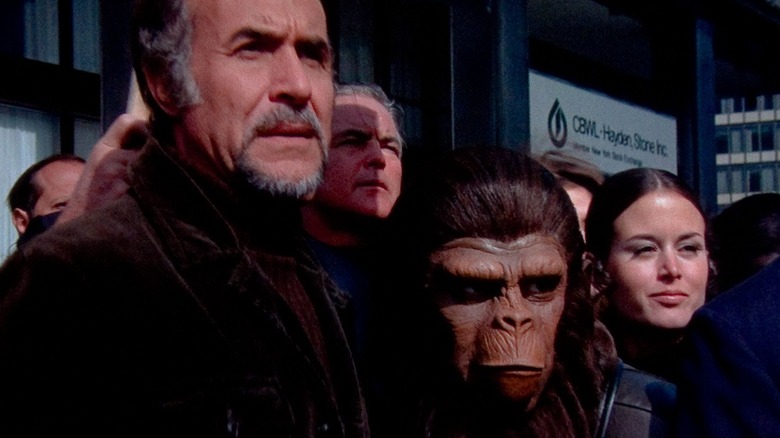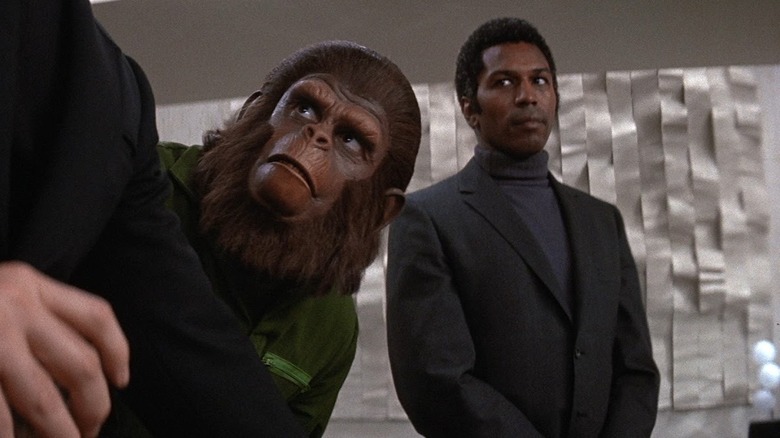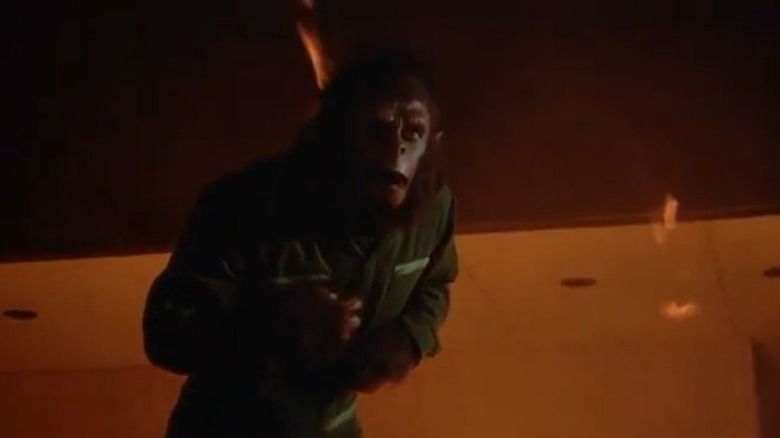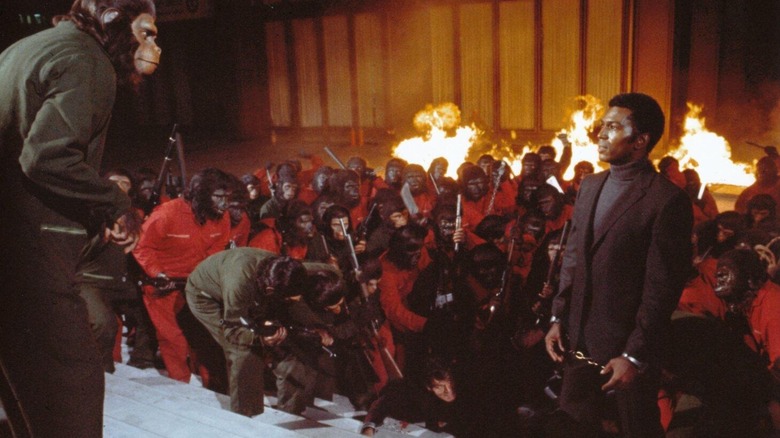Conquest Of The Planet Of The Apes Had To Change Its Ending To Avoid An R-Rating
J. Lee Thompson's 1972 sci-fi film "Conquest of the Planet of the Apes" was the fourth in the "Apes" series, although it would come to be the fulcrum point on which all future sequels would pivot. In Franklin J. Schaffner's 1968 original "Planet of the Apes," a team of astronauts would crash land on an unknown planet after accidentally traveling into the distant, distant future. There, they would find that human beings are now mute and unintelligent and that apes — chimpanzees, gorillas, and orangutans — have become the walking, talking masters of the planet. The film's famous twist ending established exactly how a planet of apes came to be, and it shall remain hidden here on the off chance a reader is unfamiliar with it.
Although the mystery of an ape planet was solved, future "Apes" sequels would lay things out more explicitly. "Beneath the Planet of the Apes," set immediately after the first, revealed that humans evolved quickly down two very separate paths, with one species living as peaceful animals on the surface and another living as skinless ghouls underground. "Beneath" ended with a massive explosion that more or less assured no additional sequels would be made.
Naturally, a sequel was made. "Escape from the Planet of the Apes" saw a trio of ape characters fleeing the planet in a spacecraft, flying through a time warp, and landing on Earth in the present day. By the end of that film, the apes Cornelius (Roddy McDowall) and Zira (Kim Hunter) have had their own intelligent ape child, a fact that sends Bradford Dillman into a stupor of apocalypse fears; he feels that if the apes live, humans will lose control of the planet. The ape child is the only one to survive.
Render unto Caesar
At the start of "Conquest," set in the near future, a virus has wiped out all the dogs and cats of the world. Desperate for housepets, the upper crust has turned to domesticating apes and training them to be butlers. While the apes in "Conquest" are not intelligent, they are played by human actors sporting the same impressive makeup as the apes from all the previous movies. The ape child from the end of "Escape" has now grown up into Milo (also McDowall) but has to pose as an ordinary ape in the care of circus owner Armando (Ricardo Montalbán). When Milo is separated from Armando, he infiltrates a mansion as a butler, changes his name to Caesar (he chooses it out of a Bible), and secretly begins training the era's apes to fire guns and attack humans. Caesar, you see, is incensed by the servitude of apes and aims to lead an armed rebellion.
The climax of "Conquest" sees a full-scale riot wherein the apes mow down humans with guns and set buildings on fire. The anti-servitude politics and metaphors for slavery are, of course, right on the surface. The film ends with a speech given by Caesar about injustice and the importance of burning the world to the ground. Caesar, you see, knows that apes are destined to one day, even in the distant future, inherit the Earth.
Where there is fire, there is smoke
While the fires burn around him, Caesar screams the following speech:
"Where there is fire, there is smoke. And in that smoke, from this day forward, my people will crouch and conspire and plot and plan for the inevitable day of Man's downfall — the day when he finally and self-destructively turns his weapons against his own kind. The day of the writing in the sky, when your cities lie buried under radioactive rubble! When the sea is a dead sea, and the land is a wasteland out of which I will lead my people from their captivity!"
He then says that apes "will build our own cities in which there will be no place for humans except to serve our ends! And we shall found our own armies, our own religion, our own dynasty!" It's a speech full of rage that certainly catches the ear, and in the movie's original cut, it was where the speech ended. Caesar's righteous accusation was hard-edged and would have left audiences with a deliberately downbeat ending.
The ending, it seems, was too much for the ratings board of 1972 to bear. While "Conquest" was released with a PG rating — and this was already after the previous three films were rated G — it was only allowed to do so after a drastic alteration that changed the entire tone of the film. According to Den of Geek, the makers of "Conquest" had to add a few extra lines of dialogue wherein Caesar walked back his rage and talked about living in harmony. The dialogue was edited awkwardly over reused footage of Caesar, and the tone of his voice changed dramatically.
The gentle ending
After a litany of hate, Caesar seemingly remembered his "Star Trek" lessons and proposed, out of the blue, a more diplomatic future for humans and apes, saying:
"But now ... now we will put away our hatred. Now we will put down our weapons. We have passed through the night of the fires, and those who were our masters are now our servants. And we, who are not human, can afford to be humane. Destiny is the will of God, and if it is man's destiny to be dominated, it is God's will that he be dominated with compassion, and understanding. So, cast out your vengeance. Tonight, we have seen the birth of the Planet of the Apes!"
"Dominated with compassion" is certainly a fraught phrase, especially as "Conquest" has been openly playing with the symbols and language of slavery and revolution.
Yes, the world was seemingly saved from violence, but a great deal of the film's overall impact is significantly diminished as a result. It also adds an element of tragedy to the film that director Thompson likely didn't intend. Seeing as the apes in the revolution are ordinary Earth apes and not hyperintelligent future apes, the notion of having to train them to "compassionately dominate" humans seems like a fool's errand. Especially after they've been trained to fire guns. It seems that Caesar's call for compassion may be doomed to fail, as his army is, after all, comprised of mere animals.
The fifth film in the series, 1973's "Battle for the Planet of the Apes," sees that humanity has already been largely wiped out, the apes have inexplicably become intelligent, and the two species live in relative harmony, with apes in command. It seems, thanks to the clunky final chapter, everything worked out for the best-ish.



